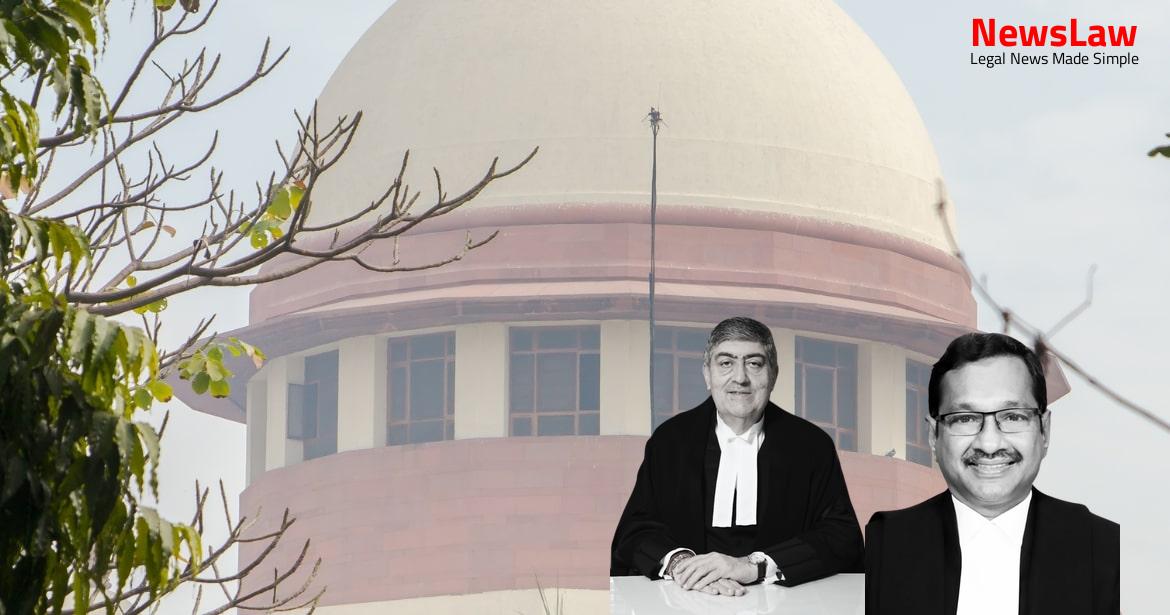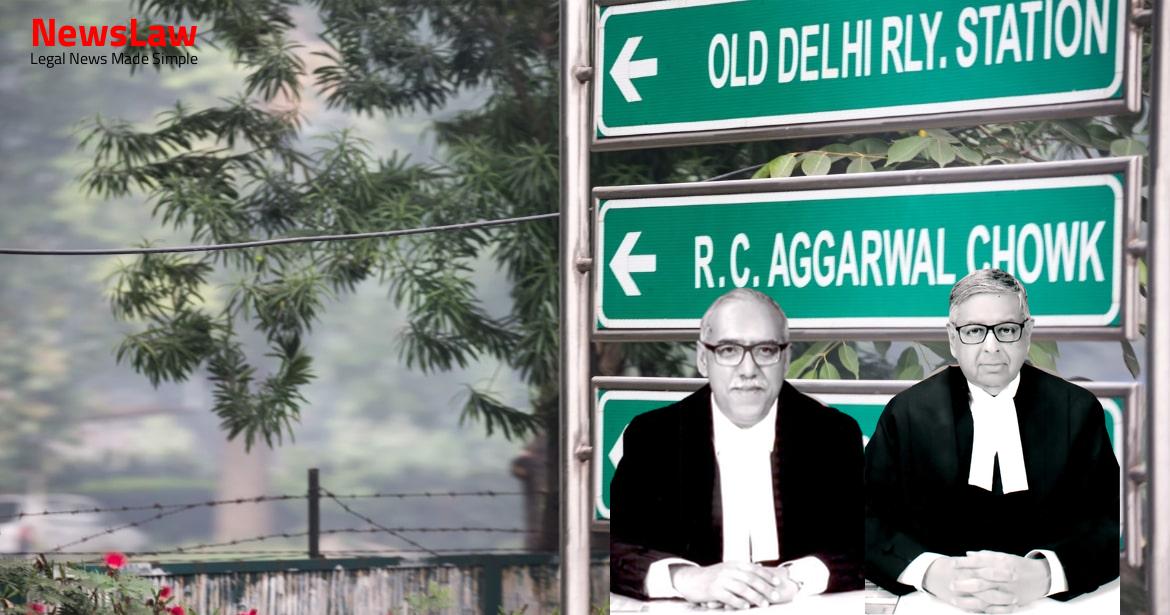The case delves into the intricate legal analysis of Order XXI Rule 16 of the CPC, emphasizing the court’s elucidation on the application of this rule in execution proceedings. The court’s thorough examination of the law and its implications provides clarity on the interpretation and implementation of legal provisions governing assignment deeds. Stay tuned for a comprehensive analysis of the court’s findings and their impact on the legal landscape.
Facts
- Shri S.N. Kanungo filed an execution case to recover an amount but it was challenged by respondent No.1 in the Supreme Court.
- During the proceedings, Shri S.N. Kanungo passed away and his legal heirs substituted him in both the SLP and execution proceedings.
- Respondent No.1 was required to deposit the decretal amount in the executing court during the dispute between the parties.
- The amount deposited was supposed to be kept in an interest-bearing deposit.
- Shri S.N. Kanungo executed an Assignment Deed and provided a cheque as security for the amount owed.
- The dispute involved appellants who claimed non-payment for their work on behalf of Shri S.N. Kanungo.
- The appellants’ requests for interim relief were dismissed, and their objections claiming a right in the decretal amount were rejected by the executing court.
- The appellants entered the proceedings by filing objections under specific legal provisions.
- The Supreme Court dismissed the SLP on 19.01.2016 with a modification of the interest rate to 8% (simple interest) from the date of the bill.
- The Division Bench of the High Court reversed the single Judge’s judgment on 03.03.2008 and referred the case to sole arbitration.
- Sole arbitration was conducted by Shri T.K. Mishra who passed an award in favor of S.N. Kanungo on 31.10.2006.
- The proceedings were successful based on the learned single Judge’s order dated 28.09.2007.
- Respondent No.1 filed proceedings in the High Court of Calcutta to set aside the award under Section 34 of the A&C Act.
Also Read: Supreme Court Judgment on Single Till Mechanism for HRAB Calculation: A Comprehensive Analysis
Arguments
- The legal controversy in the present appeal revolves around the appellants’ claim as an assignee of the decree holder under Order XXI Rule 16 of the CPC.
- The appellants filed an application under Section 47 of the CPC, citing Section 146 of the CPC and Section 2(1)(g) of the A&C Act.
- The addition of an explanation to Order XXI Rule 16 of the CPC was made following the recommendation of the Law Commission of India in 1973.
- This addition was a result of conflicting views of the High Courts on the matter at hand.
- Learned counsel for the appellant argued that the CPC amendments made in 1976 are significant as the judgment predates these amendments.
- The alternative plea was based on the assertion that an assignment deed is an actionable claim.
- They relied on Order 21 Rule 16 of the CPC in their application under Section 47 by referring to Section 146 and Section 2(1)(g) of the A&C Act.
- The argument was that Shri S.N. Kanungo voluntarily executed an assignment deed and issued a cheque as security.
- Order XXI Rule 16 deals with applications for execution by a transferee of a decree.
- The rule states that a transferee may apply for execution of the decree to the Court which passed it, subject to certain conditions and hearings.
- The Explanation in the rule, inserted by the Code of Civil Procedure (Amendment) Act, 1976, allows for a transferee to apply for execution without a separate assignment of the decree.
- Learned counsel for the appellants claimed to be the authorized assigned representatives of Shri S.N. Kanungo.
Analysis
- The Law Commission supported the view in a former judgment, endorsed by High Courts of Andhra Pradesh, Patna, and Kerala.
- The amendment to Order XXI Rule 16 clarified execution of decrees for transferees without a separate assignment.
- The objective was to avoid multiple proceedings on assignment issues and resolve them in execution proceedings.
- The respondents disputed the Assignment Deed’s validity, claiming it was not raised for 17 years until 2016.
- The appellants missed opportunities to use the Assignment Deed when awards were delivered, weakening their claim.
- The distinction was highlighted regarding transfer of actionable claims as per the Transfer of Property Act, 1882.
- The Explanation was added to Order XXI Rule 16 due to conflicting High Courts’ decisions on decree assignment.
- The high courts provided transferees the option to utilize Section 146 if not covered under Order XXI Rule 16.
- The discussion concluded that importing equitable principles into Order XXI Rule 16 interpretation was deemed inappropriate.
- Failure of the appellants in lower courts was based on the Supreme Court’s judgment covering their case.
- Section 47 of the CPC specifies questions to be determined by the court executing a decree.
- Section 146 of the CPC deals with proceedings by or against representatives.
- The application sought to apply Section 47 of the CPC in the context of claiming rights under the assignment of Shri S.N. Kanungo.
- The provisions of the CPC were sought to be made applicable to the execution proceedings of an award culminating in a decree as an assignee/representative.
- The High Court of Calcutta applied an equitable principle in Purna Chandra Bhowmick v. Barna Kumari Devi.
- The plaintiff in that case, who was assigned a security by the defendant in the form of a mortgage bond for a decree in a suit against a third party, was declared an assignee of the decree and entitled to realize the decretal debt.
- The Court supported deciding complex questions in execution proceedings under Section 47 of the CPC.
- The Madras High Court agreed with this approach in the case Penniah Pillai v. T. Natarajan Asari.
- The judgment in Jugalkishore Saraf v. M/s. Raw Cotton Co. Ltd. is considered highly significant in this context.
- The learned Judge disagreed with the Madras High Court’s judgment in K.N. Sampath Mudaliar v. Sakunthala Ammal
- Opined that Section 146 of the CPC does not override Order XXI Rule 16 of the CPC
- The Law Commission aimed to clarify the legal position to avoid conflicting interpretations of the Supreme Court judgment regarding Order XXI Rule 16 of the CPC.
- Two different interpretations of Jugalkishore Saraf were noted, prompting the need for clarification.
- The Explanation states that Order XXI Rule 16 of the CPC does not affect Section 146, allowing for execution of a decree by a transferee without separate assignment.
- The appellants, though not parties in the suit proceedings, claimed as assignees of the decree holder.
- The validity of the Assignment Deed and the cheque will be decided by the executing court, not by the current judgment.
- The appellants’ objection as assignees was considered at the threshold, leaving the executing court to handle further determinations.
- Efforts for an amicable solution between parties failed, leading to the matter being remitted back to the executing court for resolution.
Also Read: Selection and Appointment of Judicial Officers in Himachal Pradesh
Decision
- The executing court will make efforts to give its consideration promptly due to the time elapsed
- The appeals have been allowed, with each party responsible for their own costs
Case Title: VAISHNO DEVI CONSTRUCTION REP. THR. SOLE PROPRIETOR (D) THR. LRS. Vs. UNION OF INDIA (2021 INSC 655)
Case Number: C.A. No.-018278-018278 / 2017



